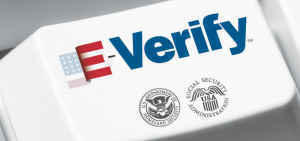ImmigrationCritics say E-Verify system still has too many problems
Lawmakers and attorneys in Minnesota believe that the E-Verify system, a government database for employers to verify that their new hires are eligible to work in the United States, may not be ready just yet.. Lawmakers have raised concerns about a clause in the Senate immigration legislation which would make the E-Verify system mandatory for all businesses within five years.

E-verify not so ready in Minnesota in five years // Source: tn.gov
Lawmakers and attorneys in Minnesota believe that the E-Verify system, a government database for employers to verify that their new hires are eligible to work in the United States, may not be ready just yet.
Minnesota Public Radio reports that Minnesota attorney DeAnne Hilgers has represented several employers who say they have been victimized by the E-Verify system, which is maintained by DHS and the Social Security Administration.
Hilgers notes one case in which her client received a call from an out-of-state resident complaining that his identity had been stolen and his social security number was being used by one of the client‘s employees.
“We gave that worker the opportunity to address the claim and he walked out the door and we never saw them again,” Hilgers, who works at Lindquist & Vennum told MPR. She declined to name her client because the client had not given her permission.
This kind of situation has persuaded Senator Al Franken (D-Minnesota) to raise concerns about a clause in the Senate immigration legislation which would make the E-Verify system mandatory for all businesses within five years.
Franken says that the system could be tough for small businesses, including small farming operations which hire many immigrant workers every year.
“The system isn’t ready for prime time,” Franken said during a press call last week. “Big businesses have the HR departments to deal with these errors. But for a small business where your accountant is also your front desk clerk and your mechanic and maybe your spouse, these kinds of errors are going to be a huge problem.”
According to the Migration Policy Institute, the E-Verify system can detect fake identification; but it has problems detecting unauthorized workers who are using stolen documents. The system also has a false-positive rate of about 0.7 percent, which, according to Franken, is too high for small businesses and farmers who need to hire people quickly.
According to a 2009 DHS report, the false-positive rate for foreign-born workers can be up to twenty times higher than for American citizens.
“Latinos often have a maternal and paternal last name, and there’s a lack of consistency in tracking both,” John Keller, executive director of the Immigrant Law Center of Minnesota, told MPR. “All of those will potentially lead to a non-authorization for employment even though the person is authorized to work.”
That can be a simple issue if a company has a large HR department to help correct the errors, “but if you’re busy 18 out of the 24 hours just doing your work, you don’t have someone designated to do this, the paperwork compliance becomes much more onerous,” Keller added.
Now the state’s dairy industry, which is required to use the system, is asking Franken for help. According to President Pat Lunemann of the Minnesota Milk Producers Association, many farmers still use people to milk their cows. Chuck Schwartau, who oversees livestock education programs at the University of Minnesota Extension – Rochester says 45 percent of non-family employees in the industry are from Mexico, Guatemala, and Ecuador.
The Center for Immigration Studies’ public policy director, Jessica Vaughan, said that the E-Verify system has improved exponentially since its introduction in 1997, and giving small businesses a free pass could lead to thousands of ineligible workers in the county.
“These are the very industries that where, in many cases, illegal workers are concentrated,” Vaughan toldMPR. “The restaurants, and the landscaping companies and some of the farming operations - they shouldn’t be frightened by this.”
Franken is still considering an alternative for the E-Verify program, but did say the system could be a requirement in the future once the error rate drops below a certain level.
